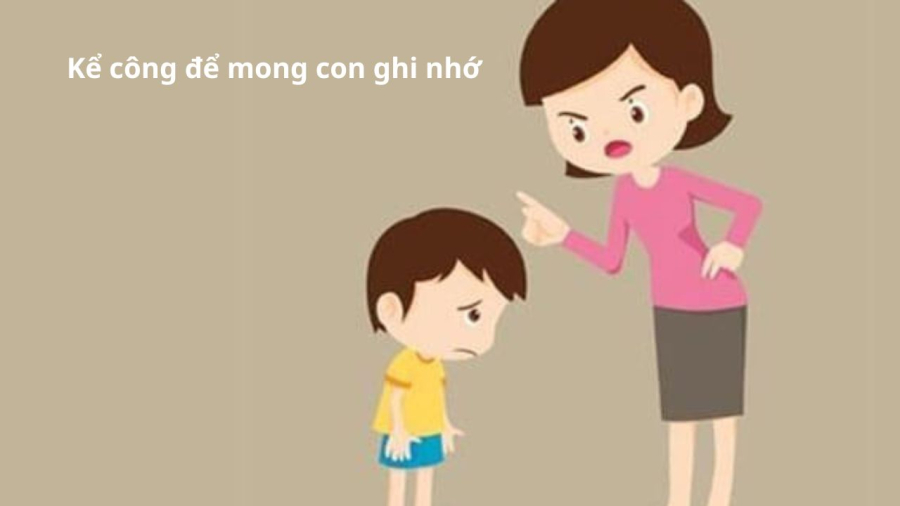For children, family happiness is not just joy but also a foundation for them to nurture their souls. Children who experience trauma when young spend their entire lives trying to heal their childhood, while children who grow up in happiness will develop their brains, intelligence, and use the warmth of their childhood to heal the hardships they encounter in life. So if you are the parents below, self-reflect and improve yourselves so that your children can enjoy happiness and always want to come home in the future:

Parents arguing in front of their child
In marriage, every wife has had disagreements and arguments. But arguing in front of your child is the worst thing to do, as witnessing parents argue is a major wound for the child. Such children will become bored at home, tired of seeing their parents argue, and they will have difficulty concentrating on studying. Parents arguing in front of their child teach them that the home environment is unstable, and it makes the child feel unsafe, with the family always anxious, conflicting, and tired. Therefore, the child will feel scared, insecure, and feel that the family is not a warm place, even growing up, they will be afraid of getting married.
Indifferent parent(s) who don’t care about their children
There are more indifferent fathers than mothers. Indifferent parents make children more irritable and prone to depression. Many fathers are more concerned about their own families and neglect their responsibilities towards their wives and children. This pushing away causes the family to be unstable and less happy, and the children become confused and fearful. Therefore, children need the love of both their father and mother to grow up healthier. A mother has the instincts of a woman, and a father has the abilities of a father. Therefore, parents’ cooperation in educating children will be better than one person alone. The concern of both the father and the mother helps the child balance their life as well as the family, making them happier.
A child lacking the love of their father or mother will be unbalanced and vulnerable to the emotional affections of others, making them more easily deceived and fall. Girls will be more susceptible to unhappiness due to uncertain feelings, while boys will become timid and easily bullied. Therefore, both husband and wife, regardless of who earns money, need to rearrange their priorities to spend time caring for their children.

A mother who dominates the father, or a father who dominates the mother, creates disharmony in the family
In a family where both the mother and the father are domineering, it is not good. If the wife dominates the husband, belittles the husband, it will make the child feel stressed, uncomfortable, and sad. And if the father dominates the mother, it will make the child anxious and insecure. Therefore, parents need to share, support, gladness, and help each other, harmonize with each other for the family to be balanced, the family atmosphere peaceful, and the children at ease. Children will feel the love when their parents love each other and respect each other. But when the family is imbalanced, the respect is uneven, one side is scared while the other side is enforcing their power, the child will have difficulty in emotional balance, and they will find it hard to feel the equal love and only witness the exercise of power.

Parents who scold and hit their children
Patience with children is a virtue of parents. If the child does something wrong, and you rush to scold and berate them, the child will feel fearful. Therefore, you need to be patient. When a child is scolded, they will lose confidence and feel more afraid. The child will doubt themselves and be confused about themselves. Therefore, find a way to acknowledge the strengths of the child and help them unravel their confusion. The child will appreciate it and will be brave enough to share their weaknesses, and in turn, the parents will help the child more. Scolding does not make the child better; it only oppresses them when they are young. When they grow up, they will find ways to get away from us to seek freedom, to escape hearing those scoldings. Be warm parents so that your children will come back.

Parents boasting and reminding their children of their favors
Many parents spend their days recounting their hardships, their gratitude, thinking that by doing so, the child will be grateful, will repay them… But that will make the child tired and feel indebted. They will not see love but feel like they are being demanded and reminded by their parents. Therefore, you should absolutely not recount your hardships, your favor, and your gratitude to your child every day.
Parents who lack optimism and blame life
Always instilling negativity into children, always complaining, lamenting about being poor at home, always blaming others in front of the child will make the child tired and feel burdened in life. Optimistic parents will give their children a bright belief in life.
So if you don’t want your children to become unhappy and spend their lives healing their childhood, then parents should improve themselves to avoid treating their children with the above-mentioned mistakes.
12 Psychological Strategies for Achieving Family Happiness as a Man
It is no secret that keeping a family happy is no easy task. Fortunately, men can utilise a number of psychological tips to help maintain a sense of harmony and joy in their household. In today’s society, the role of men in ensuring a loving and nurturing atmosphere is invaluable. Here are 12 psychological tips for men to help bring harmony and joy into their households.





































